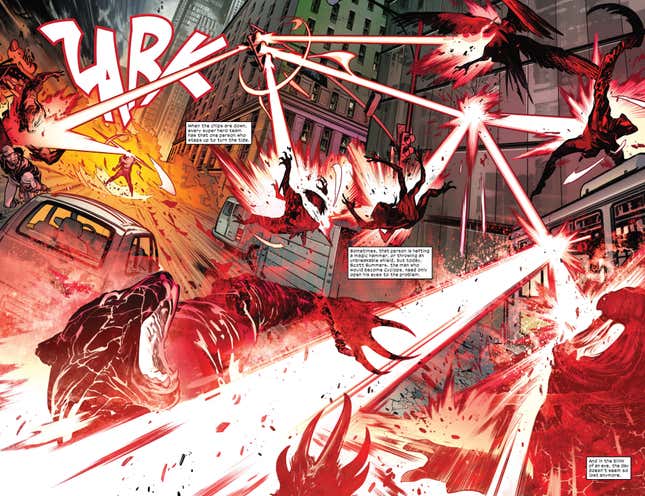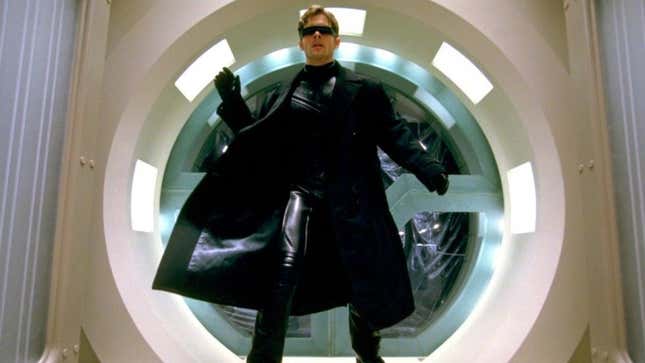[ad_1]
When X-Men ‘97 hit Disney+ last week, enrapt viewers all shouted one thing—other than “To me, my X-men!”—as they saw Marvel’s mutants back in action: “Where has this Cyclops been?”
The comics. He’s been in the comics.
X-Men ‘97 has already proven to be a smash hit for Marvel, throwing audiences back to the heady days of the X-Men’s ‘90s boom, when, between The Animated Series and a string of hugely successful books and storylines during the decade post-Chris Claremont’s legendary run on Uncanny X-Men, mutantkind reached a kind of mainstream popularity unlike any other era since. But its greatest success so far might be one that’s been almost two and a half decades in the making: the opportunity to override the other mainstream adaptation of the X-Men’s fundamentally flawed interpretation of one of the most important mutant characters around in Scott Summers.
The Cyclops of X-Men ‘97‘s premiere episodes—balancing his desires for a future away from the endless fight as he prepares to start a family with Jean Grey with the stress of leading the X-Men at a moment of global awareness of mutantkind, and the tragedy of losing his mentor Charles Xavier—is a man of multitudes. We get to see the tactical acumen that is Scott’s mainstay trait in the comics as he guides the team through his litany of plans, back-up plans, and myriad contingencies. We get to see the deeply conflicted man behind his ruby-quartz sunglasses, the push and pull of the Boy Scout who was always Charles’ favored student and the angry man he’s become from years of being knocked around by a world that hates and fears him.
And yes, we do get to see him as a badass. He’s an action hero leading from the front, as years of honing his mutant gift lets him do things we’ve never seen the character do on-screen outside of fighting games—gliding around with his optic blasts (kinetic force, not heat, never heat, please don’t get into this again) as he wipes the floor with bigots, making aerial landings with a column of red energy slowing his fall. For many, many people, returning to the X-Men for the first time since The Animated Series came to an end nearly 30 years ago, this is a Cyclops they’ve never seen before like this—a little whiny, a little goody-two-shoes, sure, but a fully fledged person and hero who is so much more than just that. A character who is righteous, and funny, and emotional, and above all, actually interesting.

This is who Scott has long been in the comics—a man pushing and pulling between how he views his own ideals as mutantkind faces struggle after struggle, one who constantly wrestles with the legacy of Xavier’s dream and his frequent inheritance of it. A man who, sacrificing a little of the restraint he has held his whole life, can level a Sentinel in a second. A man who regularly (regularly) makes a mess of his personal life and relationships because of his need to overthink every little detail, from his love life to to his leadership of many, many iterations of the X-Men over the years. He’s blessed with this depth and multilayered identity thanks, of course, to the longevity of comics as a medium. This has been true especially in the last few decades, where cavalcades of creative teams have given Scott some truly fantastic character work, from New X-Men to his resistance leader arc across Kieron Gillen’s brief time, and eventually Brian Michael Bendis’ much more fraught run, on Uncanny X-Men, and beyond into the Krakoan age. You can do so much more in decades of monthly comic books, even between reboots and creative reshuffles, than you can in a two-hour movie or even a couple seasons of animated TV.
But in spite of all that, what has not helped Scott’s mainstream reputation—and what led to the surprise that X-Men ‘97‘s take on the character is a pretty faithful continuation of his characterization from X-Men: The Animated Series—is that the decades since then have been dominated by one portrayal above all: the Cyclops of the Fox X-Men movies. Less of a knock on James Marsden and eventually Tye Sheridan (Tim Pocock was, well, Also There), the problem with Fox’s Scott is less the myriad films’ take on the character and more that he never actually really got to exist as much of one. For better or worse, Bryan Singer’s X-Men movies changed superhero films forever, and for the X-Men in particular, it meant its version of these characters became ingrained in the public consciousness in a way few others had the reach to (and still can’t escape, like Kelsey Grammar’s Beast showing back up at the end of The Marvels). And while that’s been a net positive for the characters those films ultimately focused on, namely Wolverine, Professor X, and Magneto, for characters in the ensemble left on the sidelines—i.e. anyone else except for Jean Grey, who was handled poorly for other reasons—it meant they never got the spotlight they deserved, and Scott suffered bitterly for that.

The Cyclops of the Fox films was barely a character, mostly just because it’s rare we got to sit with him as one outside of his role as the rules-stickler on the team, or his role as Jean’s tortured love interest. His powers barely got to be on display, and when they were, it was from a position of far more limited and restrained capability than the confidence we see him display in X-Men ‘97 (there’s an argument to be made of the differences in medium here, but even then, those movies always had much splashier displays of superpowers than anything they did with Scott). Scott never got to have either his role in the X-Men or as a hero explored, and rarely did we get to see him as a person beyond it either, instead fading him into the background and hobbling him with the misunderstood reputation that he’s now had in the public consciousness for so long. Now, at least, X-Men ‘97 is taking some steps toward addressing that—and hopefully this time around, interest in the series might at least get more people wanting to see what the fuss is all about in the first place, and reading some really, really great comics.
Want more io9 news? Check out when to expect the latest Marvel, Star Wars, and Star Trek releases, what’s next for the DC Universe on film and TV, and everything you need to know about the future of Doctor Who.
[ad_2]
Source link


